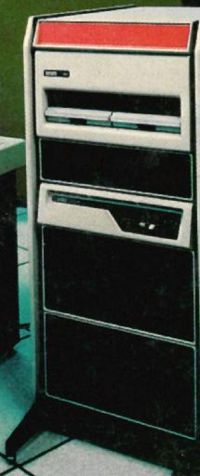Difference between revisions of "PDP-11/04"
m (typos) |
(→Registers: More detail) |
||
| Line 11: | Line 11: | ||
==Registers== | ==Registers== | ||
| − | Like its predecessor [[PDP-11/05]], the general registers (R0-R5, SP and PC) have addresses assigned to them, which makes them accessible from the KY11-LB Programmer's Console when the machine is halted. Their addresses are: | + | Like its predecessor [[PDP-11/05]], the general registers (R0-R5, SP and PC) have addresses assigned to them, which makes them accessible from the UNIBUS, and also from the KY11-LB Programmer's Console when the machine is halted. Their addresses are: |
{| class="wikitable" | {| class="wikitable" | ||
| Line 27: | Line 27: | ||
|} | |} | ||
| − | Note that the | + | Note that the registers are word-accessible at odd addresses on the UNIBUS (unlike any other device); and their addresses, like those on the -11/05, increment by 1, not by 2, as is usual for word-sized items. |
In addition, four internal CPU registers which record the CPU's most recent memory operations are also available: | In addition, four internal CPU registers which record the CPU's most recent memory operations are also available: | ||
Revision as of 16:04, 10 April 2016
The PDP-11/04 was a mid/late-70s implementation of the PDP-11 architecture for the UNIBUS; it was a replacement for the PDP-11/05. It was implemented on a single hex card (M7263), the first PDP-11 CPU to be contained on a single board.
It was the first PDP-11 to come standard without a 'proper' lights and switches front panel: the standard KY11-LA Operator's Console front panel had only 'Boot/Init', 'Halt/Cont', and power switches, and the system came with an M9301 ROM card which included a console emulator, which communicated through the console terminal.
DEC did offer the KY11-LB Programmer's Console as an option for the -11/04; it had an octal keypad, the usual 'Halt'/'Start'/etc keys, and a 6-digit LED display which showed address/data digitally.
It came in two chassis configurations: the BA11-L half-height box, which had the entire computer - card guide frame, backplane, power supply, and front panel - sliding into an evil jamming finger-trapping metal sleeve; and a full-height example, basically the same BA11-K box as used throughout the PDP-11 line. (This is very similar to its higher-spec twin, the PDP-11/34.)
Registers
Like its predecessor PDP-11/05, the general registers (R0-R5, SP and PC) have addresses assigned to them, which makes them accessible from the UNIBUS, and also from the KY11-LB Programmer's Console when the machine is halted. Their addresses are:
| Address | Register |
|---|---|
| 777700 | R0 |
| ... | |
| 777705 | R5 |
| 777706 | SP |
| 777707 | PC |
Note that the registers are word-accessible at odd addresses on the UNIBUS (unlike any other device); and their addresses, like those on the -11/05, increment by 1, not by 2, as is usual for word-sized items.
In addition, four internal CPU registers which record the CPU's most recent memory operations are also available:
| Address | Register |
|---|---|
| 777710 | Source address |
| 777711 | Source data |
| 777712 | Destination address |
| 777713 | Destination data |
External links
- PDP-11/04 at corestore.org
| v • d • e PDP-11 Computers and Peripherals |
|---|
| UNIBUS PDP-11s - PDP-11/20 • PDP-11/15 • PDP-11/35 • PDP-11/40 • PDP-11/45 • PDP-11/50 • PDP-11/55 • PDP-11/70 PDP-11/05 • PDP-11/10 • PDP-11/04 • PDP-11/34 • PDP-11/60 • PDP-11/44 • PDP-11/24 • PDP-11/84 • PDP-11/94 QBUS PDP-11s - PDP-11/03 • PDP-11/23 • PDP-11/23+ • MicroPDP-11/73 • MicroPDP-11/53 • MicroPDP-11/83 • MicroPDP-11/93 QBUS CPUs: LSI-11 • LSI-11/2 • KDF11-A • KDF11-B • KDJ11-A • KDJ11-B • KDJ11-D • KDJ11-E Buses: UNIBUS • UNIBUS map • SPC • MUD • EUB • QBUS • CD interconnect • PMI Also: PDP-11 architecture • PDP-11 Extended Instruction Set • FP11 floating point • PDP-11 Memory Management |
| UNIBUS CPUs: KA11 • KC11 • KB11-A • KB11-B • KB11-C • KB11-D • KD11-A • KD11-B • KD11-D • KD11-E • KD11-EA • KD11-K • KD11-Z • KDF11-U
Co-processors: FP11-A • FP11-B • FP11-C • FP11-E • FP11-F • KE44-A • FPF11 Chips: LSI-11 • KEV11-A • KEV11-B • KEV11-C • F-11 • KEF11-A • KTF11-A • T-11 • J-11 • FPJ11 CPU options: KE11-E • KE11-F • KJ11-A • KT11-C • KT11-D • KK11-A • KK11-B • KT24 • KTJ11-B Rare CPU options: KS11 Memory Protection and Relocation option • KT11-B Paging Option • KUV11 Writeable Control Store Front panels: KY11-A • KY11-D • KY11-J • KY11-LA • KY11-LB • KY11-P More on buses: UNIBUS and QBUS termination • Bus Arbitration on the Unibus and QBUS • CTI BUS PDT-11s - PDT-11/110 • PDT-11/130 • PDT-11/150 CTI PDP-11s - PRO-325 • PRO-350 • PRO-380 Other: FIS floating point • PDP-11 Commercial Instruction Set • PDP-11 stacks • PDP-11 family differences |
